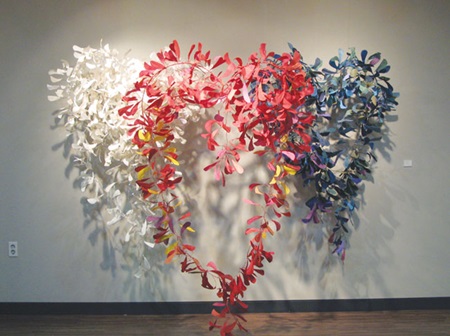Korean paper art brightens cultural centre
 |
| Heartfelt: Many selfies were taken in front of the white, red-yellow and dark blue heart – an installation from hanji by artist Yang Sang-hoon. VNS Photo |
The Saturday opening of the Hanji Meets Viet Nam exhibition featured 15 large artworks, comprised of 100 smaller pieces by Yang.
He was an obvious choice to represent the nation's traditional art form. Yang is chairman of the Korean Hanji Artists Association, tallies at least 20 solo exhibitions in South Korea, Japan and Finland and has participated in more than 150 group exhibitions.
He has won several awards over the years at the Imadate Exhibition of Contemporary Paper Art Works in Fukui, Japan and the Korean Paper Art Competition.
The theme Love Song was readily discernable to visitors at the Saturday opening. Many of the young visitors liked an eye-catching 3m-by-3m installation of hearts. Many selfies were taken in front of the white, red-yellow and dark-blue heart.
"I like the installation. The white heart represents pure love, red and yellow for passionate love and dark-blue for a sad love," noted Nguyen Thi Hue, a visitor at the opening ceremony.
"The exhibition is very light-hearted. The artworks are beautiful and the bright colours make me feel relaxed," she said. "I like artist's expressiveness, it is legendary."
The collection of work at the showing come from his repertoire over the last 10 years and includes a new piece he made for the Ha Noi exhibition. The piece is that of a woman's face, which he placed amongst a dense grouping of other small works of stars, circles, leaves and animal heads.
"I installed this work in order to emphasise the harmony of human in nature," said the artist.
"I'm happy to have the exhibition at the KCC because it is also a good way to show the sentiment of Korean people to Vietnamese," he added.
Yang likes to combine the traditional material of hanji with a technique called joomchi.
Hanji, a strong and long-lasting paper made from the inner bark of the dak (mulberry) tree can resist fading, for even more than 1,000 years. The traditional paper is used for a variety of handicrafts like hanji dresses or paper dolls.
Joomchi is a paper felting technique that dates back to the Chosun dynasty (1392-1910).
During the opening ceremony, the artist spoke about joomchi techniques with fine art students and young artists from the Vietnamese Do Project.
"Do is Vietnamese traditional poonah paper that doesn't take much time to dry. It is a special and interesting material. But I see there are only a few Vietnamese artists working with do paper," said Yang.
He also hopes to co-operate with the Do Project to make the art popular in Viet Nam and South Korea.
The exhibition is part of the Next Expert Training Programme launched by the Korean Ministry of Culture, Sports and Tourism. The programme trains performing and visual artists in order to promote international cultural exchange.
"The Korean Cultural Centre in Ha Noi not only introduces Korean culture to Viet Nam. We also aim to exchange culture between Korea and Viet Nam," said Pyeon Hyeong Mee, the exhibition curator.
The exhibition runs until April 30 at 49 Nguyen Du Street, Ha Noi.
What the stars mean:
★ Poor ★ ★ Promising ★★★ Good ★★★★ Very good ★★★★★ Exceptional
Latest News
More News
- Vietjet launches mega year-end ticket promotion (December 10, 2025 | 11:33)
- Vietjet launches daily Manila flights to celebrate year-end festive peak season (December 05, 2025 | 13:47)
- Phu Tho emerges as northern Vietnam’s new tourism hub (December 01, 2025 | 17:00)
- Vietjet completes Airbus A320/A321 updates ahead of deadline (December 01, 2025 | 09:49)
- Vietjet resumes Con Dao flights from early December (November 28, 2025 | 15:24)
- Free tickets, Lunar New Year promotions on offer at Vietjet Mega Livestream (November 26, 2025 | 15:32)
- UNIQLO unveils upgraded heat-retention wear at Hanoi event (October 26, 2025 | 10:00)
- Vietnam named among world’s top four culinary destinations (October 24, 2025 | 17:09)
- Vietnam and Denmark strengthen dialogue on sustainable fashion (October 20, 2025 | 09:11)
- Fusion rolls out special initiatives to celebrate Vietnamese Women’s Day (October 17, 2025 | 20:00)
















 Mobile Version
Mobile Version